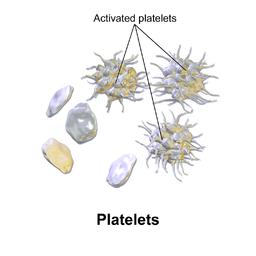Cancer is most easily "cured" when it's caught early. That's the rationale behind Pap tests for cervical cancer, PSA tests for prostate cancer, and mammograms for breast cancer. But there aren't similar screening tests for all cancers — and some, such as ovarian and pancreatic cancer are often not found until they're well-advanced, which makes them particularly lethal. Lung cancer, too, may not be found — especially in non-smokers — until it's too advanced to treat successfully, or requires extensive surgery to control. My colleague, Dr. Julianna LeMieux, has described a new type of screening tool that hopefully could find a number of types of cancer while they're in the early stages, using DNAs shed from tumor cells. In addition to this type of test, another path to early diagnosis for lung cancer has been devised — it uses the platelets in a patient's blood to ascertain the presence of non-small cell lung cancer (NSCLC), the most common type of this disease.
Led by Dr. Thomas Wurdinger of VU University Medical Center, Cancer Center Amsterdam, the Netherlands, a group of collaborators investigated the use of so-called Tumor-Educated Blood Platelets (TEP) RNAs for their efficacy and sensitivity to the presence of NSCLC. Platelets are considered "educated" when they have incorporated cell constituents, especially mRNAs, from tumor cells. Earlier work by these investigators ascertained that the mRNA sequences of these TEPs could distinguish between patients with various types of cancer, those with no cancer, and those with unrelated inflammatory diseases.
In the latest study, these investigators used blood samples from more than 700 people. These included people with early and late stage NSCLC, a group who had no known cancer, and people with other diseases but no cancer. They used a new algorithm to scan about 5,000 RNA molecules found in TEP, sifting out those which indicated cancerous tumors. Then they ran samples from their test groups to see if they could accurately predict who had the NSCLC, and which stage it was in.
According to the authors, their algorithm was a particle-swarm optimization (or POS) that was based on swarming behavior in fish and birds. They explained:
PSO algorithms are exploited for the identification of optimal biomarker gene lists, resulting in a tumor-educated platelet RNA biomarker panel that discriminates patients with NSCLC from healthy individuals and patients with various non-cancerous inflammatory conditions.
And they found that using this so-called thromboSeq test they were able to distinguish early-stage NSCLC with 81 percent accuracy, and late-stage cancer with 88 percent accuracy. When compared to the non-cancer controls, the accuracy increased to 91 percent.
While there is still a ways to go to further validate this thromboSeq test, such as predictive clinical trials in people who are not known to have NSCLC or other types of cancer, success would mean a possible way to detect early occult cancers that is not now possible.




